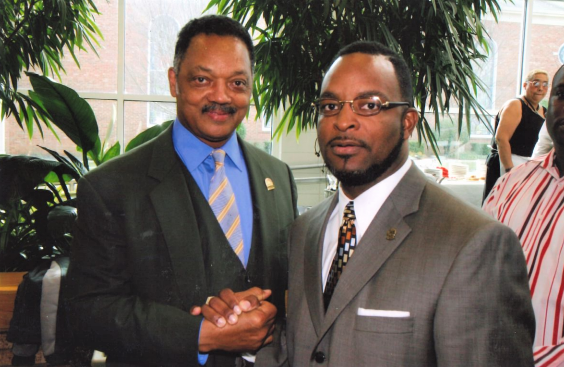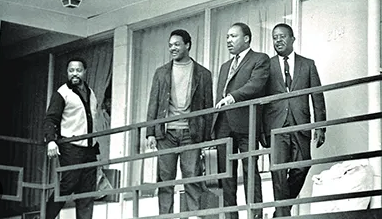SC friends say Rev. Jesse Jackson is 'pivoting' in his role as civil rights leader
- Oops!Something went wrong.Please try again later.
- Oops!Something went wrong.Please try again later.
Rev. Jesse Jackson may have announced he is stepping down as president of the Rainbow/PUSH Coalition.
However, friends and colleagues of the Greenville native are confident his work will continue. They believe the legacy of the two-time presidential candidate, who announced his battle with Parkinson's disease in 2017, will have an impact for generations.
"He's not stepping down, he's pivoting," said Davida Mathis, lawyer and director of Rainbow/PUSH in Greenville.
Mathis attended the 57th annual Rainbow/PUSH coalition conference in Chicago in mid-July. Jackson founded the civil rights organization in 1984. She remains confident in Jackson's ability to lead and perform as a civil rights advocate.
"His ideas are still innovative," Mathis said. "We laughed (at his retirement) because we know him and this work. He'll be doing this until he absolutely can't do anything else, and he's not at that point yet."
Jesse Jackson's grassroots in Greenville
Born in Greenville in 1941, Jackson attended segregated Sterling High School, where he was elected class president and earned letters in baseball, football and basketball.
During his freshman year at the University of Illinois, Jackson was part of "The Greenville Eight," a group of Black students who protested segregation at libraries throughout Greenville County.
He enrolled at the predominantly white, University of Illinois on a football scholarship. He later transferred to the historically Black, North Carolina A&T State University and graduated in 1964.
He then started his theological studies at Chicago Theological Seminary but deferred his studies when he began working full-time in the Civil Rights Movement with Dr. Martin Luther King Jr. as a full-time organizer for the Southern Christian Leadership Conference (SCLC).
Later, he was ordained in 1968 and earned his Master of Divinity degree from Chicago Theological Seminary in 2000.
His activism started in the early 1960s while a student at North Carolina A&T when he joined local protests against segregated libraries, theaters and restaurants.
Claussen bakery strike of 1967
Former Greenville NAACP president, Rev. J.M. Flemming, was a young activist in February 1967, when 22 African-American employees went on strike to protest discrimination in hiring and promotion practices at Claussen baked goods in Greenville.
Jackson helped bring King to Greenville, where King marched in support of the strikers and preached about economic justice. A historical marker was erected at the site at 400 Augusta St., in 2016.
"Jesse is an inspiration to us and our community," Flemming said. "He would always come back home. He got us to come together as one group. We were fighting the same battles then that we need to fight today ― racism, bigotry, white supremacy, poverty and education."
South Carolina's Confederate flag battle
Jackson was instrumental in a bipartisan effort to remove the Confederate flag from the Capitol in Columbia in 2015.
Jackson called the June 17, 2015, shootings in Mother Emanuel African Methodist Episcopal Church the "most-traumatic killings" since the assassination of King,

"This is the moment for a great awakening," Jackson said at a press conference called by a collection of Black elected leaders at the Allen Temple AME Church in Greenville's West End.
Former state Rep. Harold Mitchell of Spartanburg recalled Jackson's lobbying for the flag removal not being supported by everyone.
"Some Black Caucus members thought Rev. Jackson was trying to come and jump on the bandwagon in taking down the flag, but he turned the conversation to housing, Voter ID suppression, denying Medicaid expansion in South Carolina," Mitchell said. "He said the cloth was a symbol, and after it is down, what are you going to do about the agenda that is still up?"
MLK Day for Greenville County, voter outreach
Through the assistance of councilmembers Lottie G. Gibson, Xanthene Norris, and Ennis Fant, Jackson spent a year returning to Greenville County council meetings to advocate for the countywide holiday.
Finally, in 2005, County Council approved it. Greenville County celebrated the holiday for the first time in 2006.

During a get-out-the-vote tour In 2020, Jackson stopped at The United House of Prayer for All People in Spartanburg, where he met with Spartanburg leaders, including former state Rep. Brenda Lee Pryce, Mitchell and former County Councilman Michael Brown.
"As a shining black prince of community empowerment, he used the national political platform that spoke directly to the hearts and minds of working-class Black men and women," said Brown, current president of the Spartanburg NAACP chapter.
Brown said Jackson's 'I Am Somebody' speech from 1963 will always stick with him.
'I Am Somebody' is the motivational refrain that I remember as a youth that has stuck with me from that moment to now," he said.
Rev. Jesse Jackson helped 'pave the way for President Obama'
Pryce, who worked with Jackson on his South Carolina presidential campaigns, said his greatest strength was his ability to instill pride.
"He made us all stand tall and proud that I am somebody," she said. "That would always resonate with me. He was fortunate to be one of Martin Luther King's soldiers. He was a true activist, he believed in what he believed. I think he paved the way for President Obama."
Mitchell, who founded ReGenesis, a nonprofit in Spartanburg to fight environmental and health care injustices, said Jackson and former Atlanta Mayor Andrew Young are his inspirations.
"He left an impression on me about advocating for those who didn't have a voice and those who were afraid to speak out against injustices because of the real fear of retaliation," Mitchell said. "The influence and impact he had was given a bad rap because you saw him everywhere, but he was always being called."
Brown said Jackson's impact will be felt for many generations.
"He has fought the good fight, he has run the race and now he must pass the torch," Brown said. "Rev. Jackson has stood the tallest as a stalwart of more than 50 years for civil rights. His advocacy also helped elect a number of Blacks to public offices throughout this country who otherwise may have never had the opportunity to serve."
– A.J. Jackson covers the food & dining scene, along with arts, entertainment and more for The Greenville News and Anderson Independent Mail. Contact him by email at ajackson@gannett.com, and follow him on Twitter @ajhappened.
– Bob Montgomery covers Spartanburg County politics and growth and development. Reach him via email at bob.montgomery@shj.com.
This article originally appeared on Greenville News: Rev. Jesse Jackson impact in Greenville, SC as Civil Rights leader
